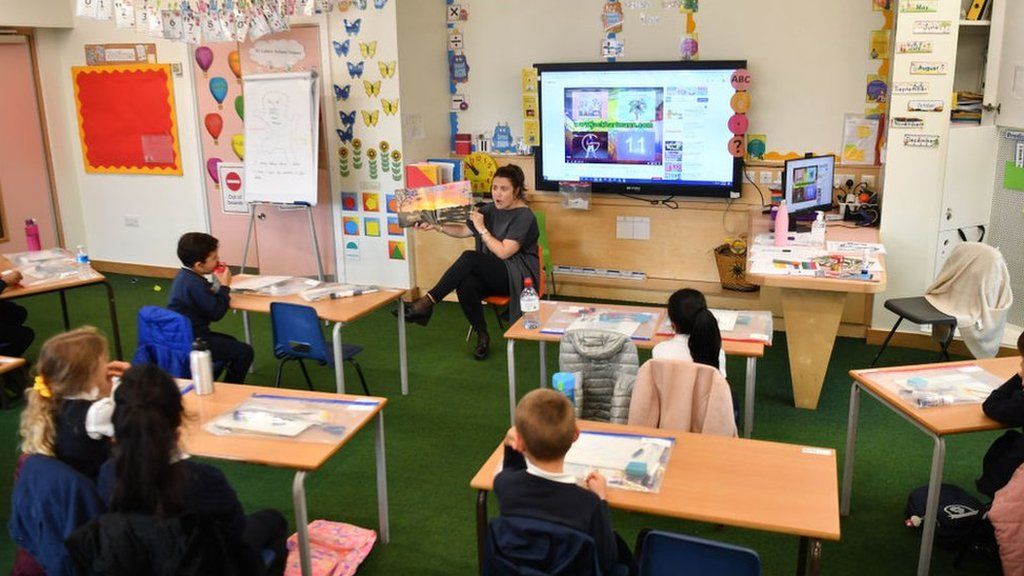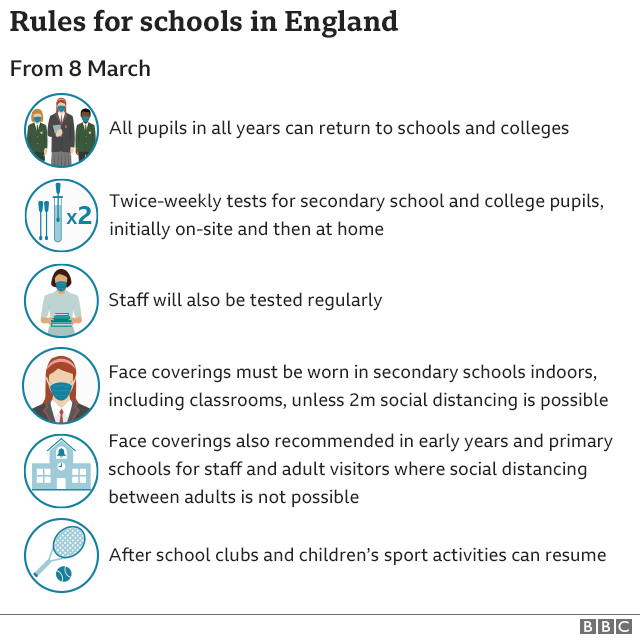
Secondary schools in England will be asked to consider delivering face-to-face summer schools as part of efforts to help pupils catch up.
An extra £420m in funding has been announced, along with £300m announced for catch-up projects in January.
Prime Minister Boris Johnson said the money will help ensure "no child is left behind" due to the pandemic.
Teachers, experts and unions called the money a "good start" - but warned about overwhelming pupils and teachers.
The prime minister confirmed all pupils will return to classrooms from 8 March as part of the first step of a roadmap for easing England's lockdown.
National restrictions since last March have led many pupils to lose around half a school year in face-to-face learning, the government said.
Announcing the catch-up plans, Mr Johnson praised teachers and parents for a "heroic job with home schooling" but said the classroom was "the best place for our children to be".
Schools will have the option to run summer classes for pupils who need it most, potentially starting with those who will be moving up to Year 7 at secondary school this year.
But there are concerns about teachers burning out if they have to work through the holiday.
Education Secretary Gavin Williamson said the average primary school will receive around £6,000 extra funding, with the average secondary school getting around £22,000 extra in recovery premium payments.
Speaking on BBC Breakfast, he said it was up to head teachers to decide how to use the money - it could be used, for example to pay teachers for overtime to do extra teaching.
Review on masks
Mr Williamson also said the policy of secondary school pupils in England having to wear masks in classrooms would be reviewed over Easter.
"We're reviewing that at the Easter holidays to see if that has had a positive impact, and the impact that Public Health England would feel is right, or whether it's going to continue to be necessary."
He did not rule out that the policy could remain in place until 21 June, which is the final date in plans to ease lockdown.
The government's £720m education support package for England includes:
- A one-off £302m "recovery premium" for state primary and secondary schools to boost summer schooling, clubs and activities
- £200m to fund face-to-face secondary summer schools, with teachers in charge of deciding which pupils benefit
- An expanded national tutoring programme for primary and secondary pupils and an extended tuition fund for 16 to 19-year-olds - also worth £200m
- £18m funding to support early-years language development
The government considered a variety of options for pupils - including extended school days and shorter summer holidays - but neither of these proposals form part of the plan set out on Wednesday.
Alongside the newly-announced programme, online resources will continue over the summer through Oak National Academy.
Exams this year have already been cancelled in England, but Mr Williamson said more detail on how grades will be calculated is coming in the next few days.
'Teacher burnout'
Kate Green, Labour's shadow education secretary, said the funding was "not adequate and will not make up for the learning and time with friends that children have lost".
"There is no specific mention of supporting children's mental health or wellbeing, which is fundamental to enabling their recovery from this pandemic," she said.
Labour also calculated the new package was worth less than the £840m spent on the Eat Out to Help Out scheme last year, and would be worth 43p per pupil per day, if the money was split across a normal school year.

School leaders' unions welcomed the funding but warned of a long road ahead.
Paul Whiteman, general secretary of the NAHT - which represents head teachers - said summer schools "will be of value for some pupils but it will be important not to overwhelm students".
Sir Peter Lampl, founder and chairman of the educational charity the Sutton Trust, called the package of measures "a promising start", but said it was "good that schools will have flexibility" to decide how to spend the money.
"However, it's important to recognise the problem of teacher burnout that could be exacerbated by additional workload."

Analysis
By Dan Johnson, BBC News
Just working out how to measure what each child has missed during the pandemic is tricky, let alone agreeing on the best way to address it and make sure they all achieve their potential.
Many teachers are wary of talking about "catching-up" and pupils being "left behind" - they do not want to discourage young people.
But there is widespread recognition that home learning could never fully replace classroom teaching and some pupils will need significant extra support when they get back to classrooms.
The government is backing one-to-one and small group tuition, alongside summer school activities.
Suggestions of a longer school day or a shorter summer holiday have not materialised.
Many teachers feel they can best assess what their pupils need, but after a relentless year, they are tired and need help in some form.
How that help is given and whether it reaches the right pupils will determine the lasting impact on the lives of children who've been through the most difficult school year.

Until children are back in the classroom, schools will not know "the depth of the problem", said head teacher Carl Ward from the City Learning Trust.
He said the government funding was a "good start", but said: "It may well be that more money is needed for more disadvantaged areas of the country".
Meanwhile, social mobility expert Prof Lee Elliot Major estimated it could take a decade to address the impact of the pandemic on children.
"Our research shows a whole generation could be educationally scarred by this pandemic," he told BBC Radio 4's Today programme.
Last year, Mr Johnson announced a £1bn catch-up fund for England, and he later appointed Sir Kevan Collins as education recovery commissioner.
In Scotland, the administration has promised £127m in funding to help disadvantaged pupils. Tens of millions of pounds have also been put into catch-up schemes in Wales and Northern Ireland.

- LOOK-UP TOOL: How many cases in your area?
- YOUR QUESTIONS: We answer your queries
- THE R NUMBER: What it means and why it matters
- TEST AND TRACE: How does it work?


How has coronavirus affected you? Are you a teacher or school student? What do you think of these plans? Email haveyoursay@bbc.co.uk.
Please include a contact number if you are willing to speak to a BBC journalist. You can also get in touch in the following ways:
- WhatsApp: +44 7756 165803
- Tweet: @BBC_HaveYourSay
- Upload pictures or video
- Please read our terms & conditions and privacy policy
If you are reading this page and can't see the form you will need to visit the mobile version of the BBC website to submit your question or comment or you can email us at HaveYourSay@bbc.co.uk. Please include your name, age and location with any submission.


https://news.google.com/__i/rss/rd/articles/CBMiLWh0dHBzOi8vd3d3LmJiYy5jby51ay9uZXdzL2VkdWNhdGlvbi01NjE3NTg5M9IBMWh0dHBzOi8vd3d3LmJiYy5jby51ay9uZXdzL2FtcC9lZHVjYXRpb24tNTYxNzU4OTM?oc=5
2021-02-24 08:29:18Z
52781399487155
Tidak ada komentar:
Posting Komentar